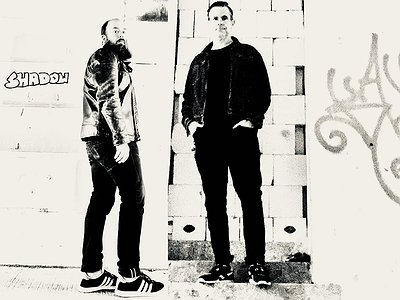Name: Tim Lefebvre
Nationality: American
Occupation: Bassist, producer
Current release: After first collaborating on a New Age Doom project, Tim Lefebvre and Gregory Macdonald formed Night Plow to keep working together. Their homonymous debut album is out 24th February 2023 via We Are Busy Bodies.
[Read our New Age Doom interview]
[Read our Gregory Macdonald interview]
If you enjoyed this interview with Tim Lefebvre and would like to know more about his work, visit his official website. He is also on Instagram, and Facebook.
For many artists, a solitary phase of creative development precedes collaborative work. What was this like for you: How would you describe your own development as an artist and the transition towards your first collaborations?
Have an idea first …and send it off others when you hit the wall on it!
Tell me a bit, about your current instruments and tools, please. In which way do they support creative exchange and collaborations with others? Are there obstacles and what are potential solutions towards making collaborations easier?
I’m using a slew of Erica synths stuff including the Basslines and LXR 02, as well as some vintage stuff like a Casio RZ1.
What I sent to Greg Macdonald for Night Plow were mostly ideas generated with those, though I also went through a huge Hologram Electronics Microcosm phase … track one is my p bass put through that machine timed with external MIDI.
What were some of your earliest collaborations? How do you look back on them with hindsight?
I’ve never not collaborated with other folks.
Earliest ones for me include a ton with Zach Danziger on projects called Blüth and Boomish. Zach started Blüth in the mid 90s with Pete Davenport: it’s considered to be an underground classic lol.
How do you feel your sense of identity influences your collaborations? Do you feel as though you are able to express yourself more fully in solo mode or, conversely, through the interaction with other musicians? Are you “gaining” or “sacrificing” something in a collaboration?
I only gain in collaboration … I love how someone else can take your idea and run with it …
There are many potential models for collaboration, from live performances and jamming via producing in the same room together up to file sharing. Which of these do you prefer – and why?
Mostly file sharing for me … I only really am comfortable improvising with people I know …. though once in a while it’s truly eye opening with strangers …
What tend to be the best collaborations in your opinion – those with artists you have a lot in common with or those where you have more differences? What happens when another musician take you outside of your comfort zone?
Yes, leaving your comfort zone is always good as long as there is an intrinsic trust there …
Do you need to have a good relationship with your collaborator? Or can there be a benefit to working with someone you may not get along with on a personal level?
Not necessarily … but it really helps to get along with said person …
Some artists feel as though the creative process should not be a democratic one. What are your thoughts on the interaction with other musicians, the need for compromise and the decision making process?
As a producer hired to produce an artist, it occasionally has to be that way …but I’m always open to ideas and will implement them if they are useful!
There are many descriptions of the ideal state of mind for being creative. What is it like for you as part of a collaboration? In which way is it different between your solo work and collaborations?
There is no specific state of mind, but sometimes you feel the intense buzz of the connection between artists.
Collaborating with one's heroes can be a thrill or a cause for panic. Do you have any practical experience with this and what was it like?
I’ve worked FOR heroes, but not with them …




